Definitive Guide to Position Sizing Strategies – Van Tharp
$249.00 Original price was: $249.00.$48.00Current price is: $48.00.
Digital Download: You will receive a download link via your order email immediately
Should you have any question, please contact us: [email protected]
Definitive Guide to Position Sizing Strategies – Van Tharp
Sale Page http://www.vantharp.com/products/definitive-guide-position-sizing.asp
Archive http://archive.is/AqiAJ
Definitive Guide to
Position Sizing Strategies
2nd Edition
How to Evaluate Your System and Use Position Sizing Strategies to Meet Your Objectives
Because…
Size DOES Matter in the Markets!
90% of Performance Variation Among Professional Traders
Is Due to Position Sizing Strategies.
Position Sizing is the Key to Meeting Your Trading Objectives.
The “How Much” Factor
Your success as a trader has little to do with selecting the right investment or even having a great system. Instead, it has everything to do with the “how much” factor when you invest or trade.
Investment professionals have called this factor “asset allocation” or “money management.” However, they failed to understand that the key aspect was “how much” to invest in any position. Others work so hard to get themselves a good system, but fail to realize that position sizing strategies are the key to getting what they really want.
When you have a great trading system, it is certainly easier to meet your system objectives through your position sizing method; however, you still have a chance to meet your objectives and profit with an average system if you understand how to position size properly. Yes, your position sizing strategy is that important.
For many years Dr. Tharp has specialized in helping traders and investors understand position sizing strategies and how to use them effectively. He originally published The Money Management Report as his guide to position sizing methods. But thanks to an overwhelming demand from his clients, we’ve now published the book you’ve all been waiting for, Dr. Tharp’s Definitive Guide to Position Sizing.
What You’ll Learn
When Dr. Tharp’s clients reviewed this book for publication, many found it so valuable that they did not want to return it once they finished their review.
In the Definitive Guide to Position Sizing Strategies you’ll discover the following:
- Psychological biases that discourage your use of position sizing strategies
- How to understand low-risk ideas.
- Systematic approaches to evaluate your system’s performance including a thorough explanation of Van’s System Quality Number® rating process
- Van’s method for defining the six market types and how you can determine in which markets your system will work best – or at all.
- Some simple and some complex ways how to let your winners win big and cut your losses short.
- How you use position sizing strategies to meet your objectives.
- How to create effective and robust objectives for your trading.
- Six realistic methods that you could use to limit your potential for ruin or to limit large drawdowns in your account.
- 96 different position sizing models (actually, there’s well over 100 possible because several of the individual models encompass multiple variations!).
- Your position sizing questions answered.
What’s New in the Second Edition
Before updating the book for the second edition, we polled readers of the first edition to find out what they liked and how they thought the book could be improved. While most readers ranked the 1st edition at 10 out of 10, we did get some valuable suggestions which we incorporated.
Here’s a list of the second edition improvements:
- Edited the style to be a little less academic and easier to read.
- Revised, expanded, and updated the market type classification section.
- Replaced a number of the original graphs with new ones which are easier to interpret.
- Added a number of new graphs to help visually oriented traders better see the data
- Added additional examples and case studies to more clearly illustrate various concepts and models.
- Added a new chapter on next steps to take so you can apply the ideas in the book more quickly.
- Added several new position sizing models derived from the existing models and added two entirely new models, one provided by Ken Long and the other provided by one of Van’s Super Traders.
- Removed two chapters that were less than essential to the central lessons (though they are still available for download).
Finally, for the second edition, some of the Excel files used in the book are available for download. Interested readers will have the ability to study some of the data from the book and experiment with it if they like.
Dr. Tharp’s Perspective
To succeed as a trader, you may think you need to understand how the markets really work, but you don’t. You only need to understand the concept that you are trading.
If you are a trend follower, you just need to understand that the markets will occasionally move in very large trends, and if you can catch the big moves, you’ll make a lot of money. If you are a value investor, you just need to understand why something is undervalued and be confident in your ability to determine that. The other two things you need to understand are (1) when your investments are no longer undervalued, meaning it’s probably time to sell, and (2) when you might be wrong about your evaluation so you can safely abort and preserve your capital.
Similarly, no matter how confident you are in your system, you will have trouble making market predictions. But you don’t have too!
Psychological research has shown that there is no correlation between the confidence people have in a future trade and the likelihood of it being a success. I think this is especially true for traders with no proven system. In fact, there is probably a slight negative correlation between confidence level and the likelihood of success. In other words, the more confident you are, the more likely it is that the trade might go poorly. What I have learned over the years is that people are just not good at predicting success.
If you still believe that you can predict some trades very accurately, then I recommend that you collect some data on these trades. When you think a trade has a very high probability of success, make a note of it in a journal. After you’ve collected at least 30 of these trades, review the results. What relationship is there between your confidence of success and the actual success of the trade?
What Is Trading All About Then?
Trading is about entering and exiting positions with the idea of meeting your financial objectives of 1) capital preservation and 2) an increase in equity. Therefore, one of the most important questions you can ask yourself are “What are my trading objectives?” and “How can I use my position sizing method to meet those objectives?”
As you’ll learn in the Definitive Guide to Position Sizing Strategies, there are probably an infinite number of possible objectives that you could have, given that there are a large number of different sized drawdowns you might want to prevent (e.g., 10% vs. 40%), and an even bigger number of gains you might aspire to make (e.g., 10% vs. 1,000,000%).
Once you determine your objectives, you can design a position sizing method to meet those objectives. How can you reach your financial goals if you haven’t spent the time determining what they are?
Is Your System Any Good?
How do you know whether or not you have a good system? How can you determine how much better one system is over another? Is there any way to do this across system types and across markets?
Is a system that wins 70% of the time better than a system that wins 30% of the time? Not necessarily!
Is a system with an average return (expectancy) of 1.5R per trade better than one with an average return of 1.2R per trade? You’d probably think so, but that’s not necessarily true either.
Or what about a system that should make 27R over the next month versus a system that should make 35R—is the 35R system a better system? You’d probably think so, but sometimes the best system is the 27R system.
Why? The “best” system will make it easiest for you to meet your objectives through your position sizing method. And in this book, you’ll learn my approach for figuring out the best system with my System Quality Number® concept. You’ll also learn how to optimize the probability of meeting your objectives through position sizing strategies. That, in a nutshell, is the real significance of this book.
In my opinion, position sizing strategies are the most significant part of any trading system.
How Much Risk Should You Take?
Isn’t it interesting that most professionals cannot even agree on the terms, let alone the definition of what is probably the most important topic for all traders and investors to understand? Some people have referred to the topic as asset allocation and others have used money management. I started using the term position sizing about three books back. Your Position sizing strategy is the difference between poor performance and great performance—the difference between going broke and being a successful professional.
Let me define position sizing strategies right now. Please take note.
Position sizing™ strategies are that portion of your trading system that tells you “how many” or “how much.” How many units of your investment should you put on at a given time? How much equity should you be willing to risk (lose)?
Aside from your personal psychological issues, this is the most critical concept you need to tackle as a trader or investor. When you started trading or investing, you had probably never heard about position sizing. If you knew something about it, your knowledge probably came from some book by an author who probably didn’t understand it either. Most books that discuss position sizing strategies are about diversification or about optimizing the gain from your trading. Books on systems development or technical analysis don’t even begin to discuss position sizing adequately. As a result, most traders and investors have no place to go to learn what is probably the most important aspect of their craft.
In the Definitive Guide book, I present many position sizing methods that you might want to use in your trading. Your choice of methods, of course, will depend upon your specific objectives, your trading system’s performance, and your comfort level with the various methods described. Your trading success still depends upon having a well thought out business plan, developing systems that you feel confident trading, and using a position sizing algorithm that you feel confident will help you meet your objectives.
Understanding Low-Risk Ideas
A low-risk idea is an idea that has a long-term positive expectancy traded at a risk level to allow for the worst possible occurrence in the short term so that you are able to realize the positive expectancy in the long term.
If you have faith in the long-term expectancy of your system and just follow the process, then everything will work out. But notice how the idea of a position sizing method is critical to a low-risk idea. If your position sizing strategy risks too much for your R multiple distribution profile, you are guaranteed to eventually lose your funds.
Let me state that another way. If you risk too much money on one trade, you risk depleting your funds so much that you can no longer trade effectively. And if you trade with too little capital, almost any trade you make will risk “too much.”
What Works (or Doesn’t Work)
To make this book a true “definitive guide” to position sizing strategies, I’ve attempted to cover every method I’ve ever seen, even ones I don’t like.
You will learn 32 different models and 3 different equity calculations so in this book alone you have 96 different position sizing models (i.e., 32 times 3) that you can use. (Actually, several of the models have more than one variation so you easily have over 100 position sizing options.) It’s important to note that psychological biases have prompted people to invent models that don’t work and shouldn’t’t be used. To help you steer clear of the same mistakes, I devoted an entire chapter to methods to avoid.
Furthermore, many of the methods presented have multiple derivative models. For example, you could probably come up with thousands of varieties of market’s money alone. In fact, knowledgeable traders could probably spend much more time crafting effective position sizing strategies as average traders spend on entries.
The Definitive Guide to Position Sizing Strategies is one of the most valuable, if not the most valuable, tool to add to your trading system. When you consider the value of the knowledge in this book and its potential ROI, the cost is quite reasonable.
The Next Step
My recommendation to you is that you determine your objectives for your trading.
• What are you trying to accomplish in regards to capital preservation and growth of your money?
• What are you endeavoring to achieve financially?
• Ask yourself “Who am I?” and “What are my financial goals?”
I cannot overemphasize the importance of this step.
Next, follow the guidelines in this book for using one of the methods to meet these objectives. Work with the methods you are attracted to until you thoroughly understand them and feel comfortable with them. Understand how the method works and develop confidence using it before you start trading with it.
When you know your R-multiple distribution, your system’s expectancy, and your System Quality Number (SQN)® score, you no longer have to do the impossible and try to predict the market. You will use position sizing strategies to let your profits run and cut your losses short. You will know what to expect from your system in the long run. And as long as you position size to avoid any worst-case disasters, you should be able to achieve that expectancy.
Are you beginning to see how trying to predict the markets and thinking you need to pick the perfect stock can steer you away from what works? When a pollster predicts how the American population will vote, he doesn’t necessarily know or understand why. He just knows what the likely outcome of the vote will be given the probabilities. After you read this book you will have enough information to understand your objectives, your system’s performance, and which position sizing strategies will help you meet your objectives. That’s all you’ll need.
In over 400 pages, I cover the hundreds and hundreds of questions and situations that I’ve encountered as I have taught this concept to trader after trader during the past 20 years. This definitive guide is truly my ultimate knowledge on position sizing strategies. And based on what numerous clients have told me year after year after looking far and wide, they consider me the foremost expert on the subject.
— Van K. Tharp
Table of Contents – Overview
• The Golden Rules of Trading
• Risk and R-Multiples
• Evaluating the Quality of Your Trading System
• What Can I Expect in the Future?
• The Most Important Factor (besides you) in Your Trading
• CPR for Traders and Investors
• Core Position Sizing Models
• More Position Sizing Models
• Comparing the Impact of Various Models
• Meeting Your Objectives
• Position Sizing Methods to Meet Your Target Profit Objective
• Using Fixed Ratio Position Sizing to Meet Your Profit Target
• Position Sizing Methods to Help You Avoid Ruin
• Position Sizing Strategies to Avoid!
• Putting it All Together: An Interview With Chris Anderson
• How to Proceed
• Questions and Answers
Reviews
What traders are saying about the Definitive Guide to Position Sizing:
“The Definitive Guide to Position Sizing has a simple, comprehensive, effective way to evaluate the ‘goodness’ of any system: the System Quality Number. This is great for evaluating a single system, a single system under various market conditions, and a system that consists of many sub-systems in various market conditions.
These topics offer a rational and thorough basis for combining probability, gambling, risk and return in a manner that improves people’s financial lives. It gives traders that edge that we all look for but in a way that, if every trader had this same edge it, probably wouldn’t hurt anyone.
Now I can see how it is possible, with reasonable work, to achieve 100%+ annual returns with acceptable drawdowns. I can see how I can easily and effortlessly achieve 45% annual returns with minimal drawdowns.
It got me thinking about the elements of the condition of a market. What makes it “better” or “worse” for a particular system? The book presented the most ways to position size I have ever read, with many ways to consider position sizing for a trading system. Imagining and testing most of these will be a wonderful way to improve my trading.
I’m now focusing on what kinds of systems and what method of position sizing are appropriate, and what combinations of these position sizing methods will be most useful for which systems under which market conditions to accomplish my goals and objectives.
The review of software related to position sizing was also a big help and a great place to start with software that includes many of Van’s principles. The questions and answers stimulated my thinking about many trading issues and potential biases.
It is crystal clear how entries are so relatively unimportant and why more time and thought devoted to position sizing is so much more valuable to my trading and my life.
Through reading this book I discovered new ways to define my objectives quantitatively.” — Jim W.
Delivery Method
– After your purchase, you’ll see a View your orders link which goes to the Downloads page. Here, you can download all the files associated with your order.
– Downloads are available once your payment is confirmed, we’ll also send you a download notification email separate from any transaction notification emails you receive from IMC.sale.
– Since it is a digital copy, our suggestion is to download and save it to your hard drive. In case the link is broken for any reason, please contact us and we will resend the new download link.
– If you cannot find the download link, please don’t worry about that. We will update and notify you as soon as possible at 8:00 AM – 8:00 PM (UTC+8).
Thank You For Shopping With Us!
Be the first to review “Definitive Guide to Position Sizing Strategies – Van Tharp” Cancel reply
Related Products
Forex & Trading
Forex & Trading
Forex & Trading
Forex & Trading
Internet Marketing
Forex & Trading

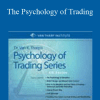
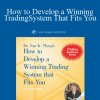
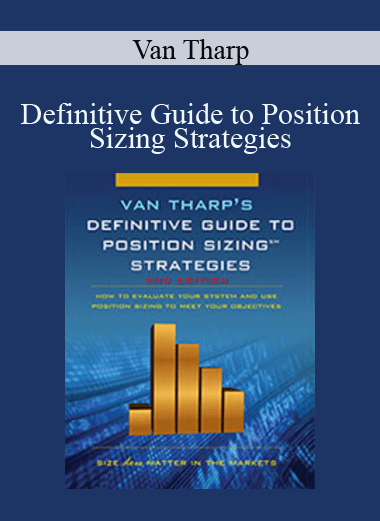
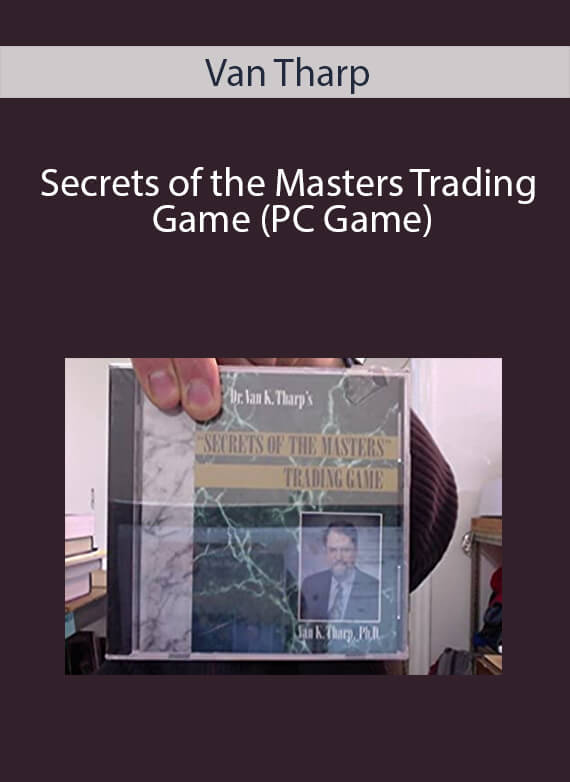
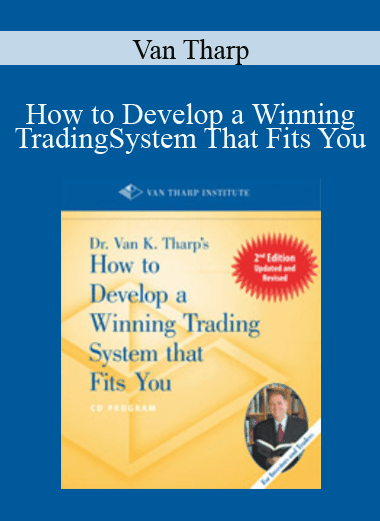
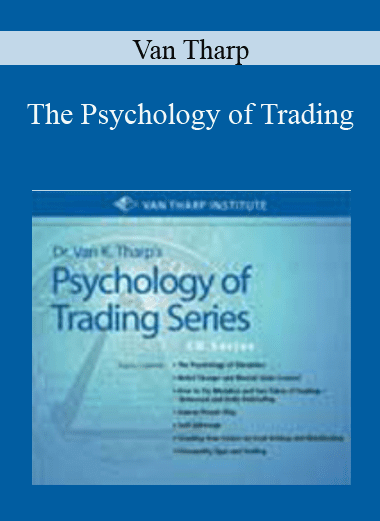
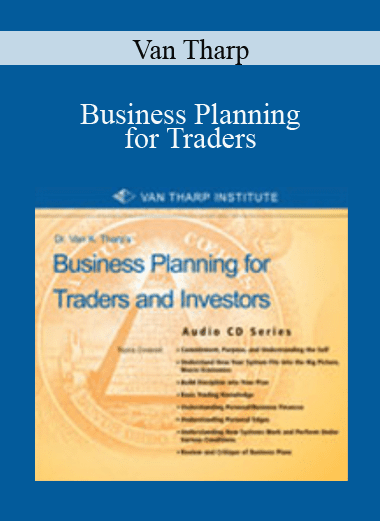
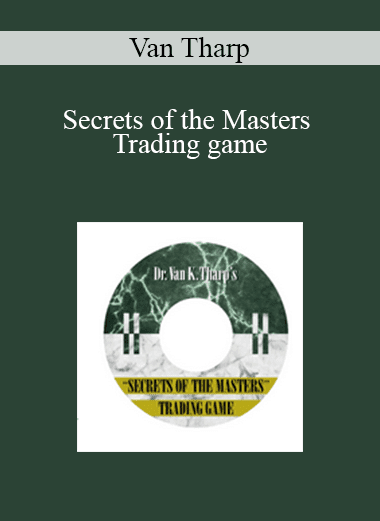

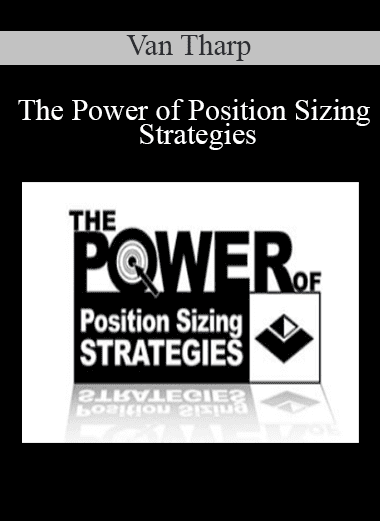
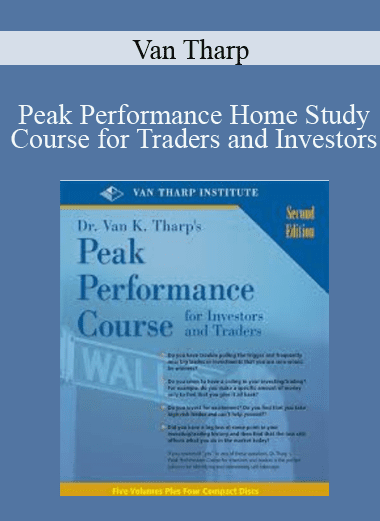
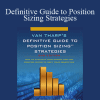
7 reviews for Definitive Guide to Position Sizing Strategies – Van Tharp
There are no reviews yet.